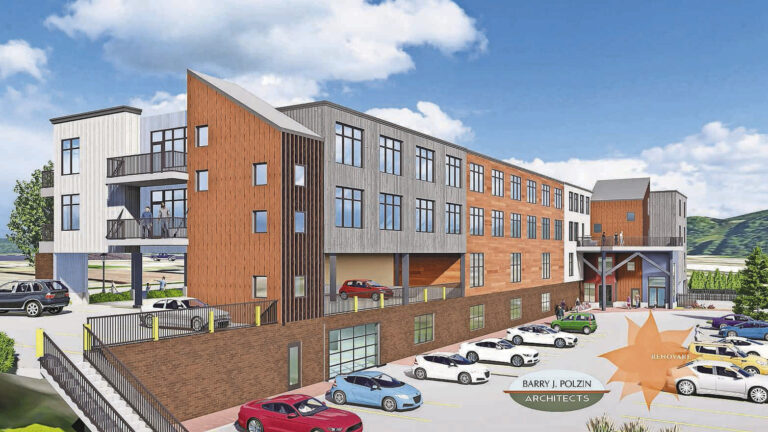The Munising Marketplace and Fire Hall projects are at significant risk after the Alger County Commission failed to approve a resolution on Monday, Oct. 16, leading to multiple questions about good governance at the local level and the ability of local units of government to review federally-regulated funding.
The resolution would approve a brownfield plan that would be used to help finance the roughly $14 million projects spearheaded by Renovare Development. It was the last piece needed to go in front of state funding sources in December after approvals already through the Alger County Land Bank, Munising Downtown Development Authority and the Munising City Commission. Dozens of local meetings and multiple public hearings were held over the last year regarding the project between the various government entities.
The resolution failed after a 2-2 tie, with Commissioners D. Michael Nettleton and Kelly Livermore voting yes and Commissioners Mick Rondeau and Rick Capogrossa voting against it. Commission Chair Dean Seaberg was not in attendance.
Capogrossa initially attempted to table the vote over questions he had about the project, but could not express any specific questions. He brought up concerns over the tax capture, which is the responsibility of the DDA, and parking concerns, which is a land use issue regulated by the city.
“I have some questions on this. I know (Seaberg) had questions on this where there weren’t any answers,” Capogrossa said. “There’s more information that he’s looking for.”
At a public hearing held by the county commission last Tuesday, Oct. 10, multiple people involved in the project from Renovare Developers, architects and UP Invest attended. All five commissioners were in attendance. Zero questions were asked by Seaberg or Capogrossa. Rondeau asked a question, but it was about a different document that was unrelated to the project. Two messages of support for the project were read from community members not in attendance, but there were no questions from the public either.
“I just don’t know why we weren’t asked these questions before,” said Jill Ferrari, Managing Partner of Renovare Development. “We’ve responded to the community before when locals have said something was not going to work, but there were no answerable questions here.”
Nettleton was quick to chastise Capogrossa and Rondeau for their lack of preparedness before the meeting.
“It is incumbent on us as commissioners to be prepared when we enter this room. There have been ample opportunities for questions to be asked,” Nettleton said.
Livermore also expressed frustration about how the delay would impact the success of the project.
“I’m right there with (Nettleton), because there were plenty of opportunities, even with boards that we, as commissioners, are on,” she said. “The part that’s the worst for me is throwing the timeline off even more, so delaying this is really disappointing.”
According to Alger County Treasurer Pam Johnson, there was a meeting held over teleconferencing of the Brownfield Committee where Seaberg had left after questioning funding sources.
“(Seaberg) left halfway through the meeting. He asked for all investors and logged off when Renovare officials could not disclose every investor,” Johnson said.
The county commission has questioned overlaps between conflicting statutes before, such as how voting procedures work with balloting for the Board of Canvassers without violating the Open Meetings Act. Other groups have also brought up concerns with certain issues of state laws for financial disclosures in the last decade. Munising Public Schools had to deny a fuel bid because the parent company of Holiday Gas Stations did not abide by Michigan’s Iran Economic Sanctions Act in 2022. Northern Michigan University violated the Freedom of Information Act by refusing to disclose a contract with alumnus Howard Schultz, who gave special franchising discounts to put in a Starbucks in the newly built Jamrich Hall in 2014. NMU and the NMU Foundation was found to have acted legally in absorbing the former Marquette General Hospital building, which qualified private developers for more public funding sources. However, that was after a long and public battle between thenstate Representative Sara Cambensy, the university and the Michigan Attorney General’s Office last September.
Ferrari said that there were multiple groups involved in the private funding of the project, most of which are federally regulated through various opportunity funds. She said that opportunity funds are primarily funded through capital gains taxes, so there would be no foreign investments available through that funding structure.
“We aren’t trying to hide anything.We have multiple actors who are verified investors. These groups are accredited to make sure their investments are good,” she said. “This is a local project, so we go through Invest UP. It’s not some international campaign.”
Regardless of the most recent vote, the county had previously approved a loan for various start-up costs related to the project through the land bank, meaning county taxpayers will be impacted if the project goes through or not.
Without the resolution, over $2 million in state funding could be lost due to funding timelines. It also means the construction of the buildings would also be at risk. Ferrari said that a grocery store chain was very interested in the project, but was not hopeful the company would be interested in the space if the project was delayed.
“I can’t divulge the brand, but we have someone very interested in setting up a grocery store in this project. If this is delayed further, other aspects like this could be put at risk,” she said.
The commission did vote to hold a special meeting on Friday, Oct. 27, at 4 p.m. to see if further clarity could be brought to the project and approve the resolution.
